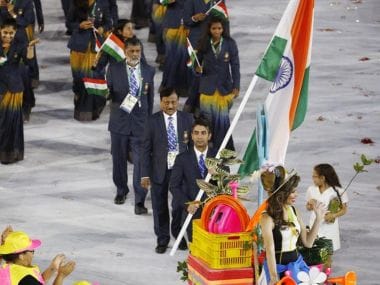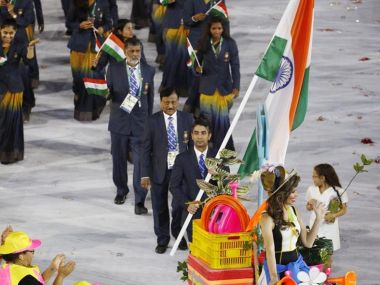By Abhishek Waghmare India’s last Olympic gold-medal winner, Abhinav Bindra, recently pointed to United Kingdom’s spending on athletes at the Rio Olympics, emphasising the money needed to convert performance into medals.
An IndiaSpend analysis of spending on Olympics in particular, and sports in general, reveals that India spends roughly a third to a fourth of the money spent by the UK, which won 67 medals, compared to India’s two—and central funding to sports federations is falling. The UK spends money on fewer athletes compares to India, where spending is diffused among numerous federations and athletes, according to our analysis. The UK has 18 million people aged between 15 and 35, while India has more than 400 million youth in that age group. The
original story
in the Guardian, a UK newspaper, calculated a £ 5.5 million ($ 7 million) investment per medal by UK Sport, a government body that funds and manages Olympic sport. [caption id=“attachment_2969880” align=“alignleft” width=“380”]
 Abhinav Bindra as India’s flagbearer at the Rio Olympics 2016 Opening Ceremony. Reuters[/caption] The UK, in general,
spends
$1.5 billion (Rs 9000 crore) on sports infrastructure and training through an annual sports budget, while UK Sport
spent
about $350 million on Olympics preparation over four years (2013-2017). In comparison, India spends a third of UK, or $500 million (Rs 3,200 crore) on youth affairs and sports through the
union budget
and the states, according to estimates from our review of sports budgets of six large states. The same union budget funds—through the ministry of youth affairs and sports—national sports federations (NSFs) and potential Olympic athletes through the National Sports Development Fund (NSDF) and Target Olympic Podium (TOP) programme. The NSDF is also funded through private organisations and public sector enterprises, apart from government contributions. In India, Rs 750 crore was spent on sport-specific federations, training centres, coaches and other infrastructure over four years (2012-13 to 2015-16), while the spending on athletes is Rs 22.7 crore through NSDF (109 athletes) and Rs 38 crore thought the TOP programme (97 athletes for 2016 Olympics, excluding para Olympic athletes) over the last four years. Policy focuses on Olympics, but sports funding is declining The number of recognized national sports federations has
come down
from 57 to 49, as of 2016, and their funding has fallen over the last three years, as the following chart shows. Of the amount spent on sports infrastructure and coaching, only 8 percent is spent on special coaching to athletes. Of the 109 athletes supported by NSDF, only 30 made it to the official contingent of India at Rio de Janeiro in the 2016 Olympic games. Of the 97 athletes funded through the TOP programme, 68 made it to the contingent, while 29 did not. The Rs 22.7 crore ($ 3.5 million) spent for by NSDF on potential 109 Olympic athletes translates to Rs 5.2 lakh, or $9000, per athlete every year in the run-up to Olympics. Athletes under the TOP scheme received Rs 9.8 lakh, or $ 16,000, per athlete every year, including cost of training centres and coaching fees. In the UK, funding of Olympic preparations is 4 times that of India The UK, which finished third on the Rio medals tally,
spent
$350 million on
374 athletes
, which is about $1 million per athlete, including infrastructure, training and coaching. Specific
spending
on medal-winning athletes went up to $36,000 a year, four times the $9000 that India spent on its athletes. The UK started specific or targeted spending only
after 1997
, in the run up to the 2000 games. There appears to be a direct correlation between money spent by the UK and Olympic medals won. With a funding of 5 million pounds for the Atlanta Olympics, where it won a single gold medal and finished 36th, the UK finished second at Rio, its best after a century (it was first in 1908) with 27 gold medals.
Abhinav Bindra as India’s flagbearer at the Rio Olympics 2016 Opening Ceremony. Reuters[/caption] The UK, in general,
spends
$1.5 billion (Rs 9000 crore) on sports infrastructure and training through an annual sports budget, while UK Sport
spent
about $350 million on Olympics preparation over four years (2013-2017). In comparison, India spends a third of UK, or $500 million (Rs 3,200 crore) on youth affairs and sports through the
union budget
and the states, according to estimates from our review of sports budgets of six large states. The same union budget funds—through the ministry of youth affairs and sports—national sports federations (NSFs) and potential Olympic athletes through the National Sports Development Fund (NSDF) and Target Olympic Podium (TOP) programme. The NSDF is also funded through private organisations and public sector enterprises, apart from government contributions. In India, Rs 750 crore was spent on sport-specific federations, training centres, coaches and other infrastructure over four years (2012-13 to 2015-16), while the spending on athletes is Rs 22.7 crore through NSDF (109 athletes) and Rs 38 crore thought the TOP programme (97 athletes for 2016 Olympics, excluding para Olympic athletes) over the last four years. Policy focuses on Olympics, but sports funding is declining The number of recognized national sports federations has
come down
from 57 to 49, as of 2016, and their funding has fallen over the last three years, as the following chart shows. Of the amount spent on sports infrastructure and coaching, only 8 percent is spent on special coaching to athletes. Of the 109 athletes supported by NSDF, only 30 made it to the official contingent of India at Rio de Janeiro in the 2016 Olympic games. Of the 97 athletes funded through the TOP programme, 68 made it to the contingent, while 29 did not. The Rs 22.7 crore ($ 3.5 million) spent for by NSDF on potential 109 Olympic athletes translates to Rs 5.2 lakh, or $9000, per athlete every year in the run-up to Olympics. Athletes under the TOP scheme received Rs 9.8 lakh, or $ 16,000, per athlete every year, including cost of training centres and coaching fees. In the UK, funding of Olympic preparations is 4 times that of India The UK, which finished third on the Rio medals tally,
spent
$350 million on
374 athletes
, which is about $1 million per athlete, including infrastructure, training and coaching. Specific
spending
on medal-winning athletes went up to $36,000 a year, four times the $9000 that India spent on its athletes. The UK started specific or targeted spending only
after 1997
, in the run up to the 2000 games. There appears to be a direct correlation between money spent by the UK and Olympic medals won. With a funding of 5 million pounds for the Atlanta Olympics, where it won a single gold medal and finished 36th, the UK finished second at Rio, its best after a century (it was first in 1908) with 27 gold medals.
Indian badminton player Saina Nehwal’s Hong Kong trip in 2010—where she won the Hong Kong super series and rose to World No. 2—was funded by Olympic Gold Quest, a foundation created and supported by former sports persons. The sports ministry spent Rs 1500 crore on organizing the 2010 Commonwealth Games, taking the sports ministry budget to an unprecedented Rs 3000 crore, but has not shown a similar inclination to fund sportspeople, IndiaSpend
reported
in 2014. The National Sports Development Fund, we noted, does not use its money
effectively
.
)